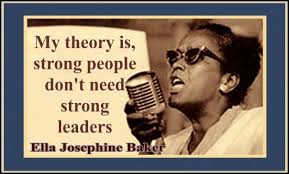
David Anderson, Staff Writer |
Political activist Ella Baker was born in 1903 in Norfolk, Virginia. She spent her childhood in North Carolina, where she was close with her grandmother who shared with Ella her graphic experience as a former slave. Baker attended Shaw University in Raleigh, North Carolina and graduated as valedictorian of her class.
After graduating in 1927, she moved to New York City and began the Young Negroes Cooperative League in 1930. The goal of the league was to develop black economic power through the pooling of funds and collective planning. Focusing on black socioeconomic freedom would be one of the focal points of her entire career.
The Ella Baker Center for Human Rights quotes her as saying, “People cannot be free until there is enough work in this land to give everybody a job.”
In 1940, she began traveling extensively as field secretary for the NAACP and was promoted to their National Director of Branches in 1946. She stayed in this position briefly, resigning to take care of her niece in New York. However, while she wasn’t traveling, she was by no means docile. Baker stayed involved in her local community through the New York Urban League and the NAACP’s New York chapter.
In 1957, Baker became involved in the Southern Christian Leadership Conference (SCLC) at the request of Dr. Martin Luther King Jr. She ran a voter registration campaign entitled the Crusade for Citizenship, and she helped form the Student Nonviolent Coordinating Committee (SNCC). She joined the members of the SNCC with the Congress of Racial Equality to organize 1961’s Freedom Rides. Similar to the actions taken by Rosa Parks, the SNCC sought to end the de facto segregation of public transportation. Several court cases had deemed segregation to be unconstitutional, but the Interstate Commerce Commission (ICC) had not enforced these proceedings.
So 13 black and white civil rights activists launched several bus trips through the deep South to counteract the segregationist reality. The riders experienced tremendous violence at the hands of angry white mobs as they made their trips down into Alabama. This violence gathered enough attention that in the fall of 1961, the ICC was forced to finally implement desegregation of bus terminals.
Baker left the SCLC in 1960 but remained active in the cause and helped establish the Mississippi Freedom Democratic Party, an attempt at offering voters an alternative to the segregationist Democratic Party.
Baker’s commitment to political activism never wavered. As she aged, she offered assistance to the Third Women’s Coordinating Committee and the Puerto Rican Solidarity Committee. She was nicknamed Fundi, which comes from Swahili and refers to a person who passes down a craft to the subsequent generation. She died on her birthday at the age of 83 in New York City.
Leave a Reply